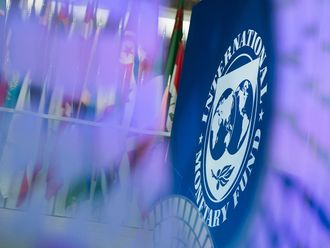Dubai: Societe Generale, one of the largest European financial services groups, is making a solid turnaround in commercial and financial performance after going through very challenging operating conditions for the last few years said Frederic Oudea, CEO of Societe Generale.
“We continue to operate in a very challenging environment with very low interest rates and even negative rates. We have shown in the first nine months that our business model is a good one. Overall resilient French retail franchise has supported us,” said Oudea.
It is the retail business that has suffered great deal from the negative rates in the Eurozone. But thanks to strict monitoring of operating costs and cost of risk, the margins and overall quality of portfolio have improved this year, helping the bank to maintain good profitability.
“Overall, for the first nine months, we have a strong increase of our net profits, Our profitability is good. Converging towards 10 per cent return on equity, we are doing much better than our peers,” said Oudea.
While the bank is rationalising and restructuring its traditional branch network model in France with a 20 per cent redundancy by 2020, it is also investing in new digital channels.
“We are implementing new projects with digital technologies. I think it reflects the capacity of the group to innovate, which is particularly important for the French retail. In the first nine months of the year our revenues have been impacted by the negative rates, but the profitability, thanks to our capacity to adapt, is resilient,” he said.
The international Retail Banking and Financial Services focused mostly in Central and Eastern Europe, Russia and Africa posted a strong performance during the year. Revenues are growing in these markets because these are in countries that generally have better economic activities, GDP growth, with overall a different situation on the rates.
The biggest relief for the bank has come from its operations in Russia which reported a profit in the third quarter of this year. “For the last few years Russia was the biggest challenge we faced. But today it is back on a convincing profitable trajectory. We have seen a significant fall in costs and improvement in credit quality. I am confident that Russia will contribute to the net profit of the group. ” he said.
Oudea sees steady improvement in European macroeconomic conditions while more uncertainty coming from evolving political scenario and forthcoming elections in countries such as France, Germany and the Netherlands.
“Elections bring a certain amount of uncertainty. But each situation is different. In Austria the elections went to support the candidate who was more pro-Europe. I think that in France and Germany the political culture supportive of Europe remains resiliently good. I remain overall confident favourable outcomes in these elections,” he said.
While Brexit has cast a long shadow on the integrity of EU, Oudea said the overall impact on EU will be limited. “The Brexit has created a surprise, but I would say at this stage the impact is relatively limited. We expect more impact in the UK next year and we think we will have growth next year in Eurozone more or like this year”, he said.
While the overall ECB monetary policy is expected to be accommodative through 2017, in the context of gradual policy tightening in the US, ECB is also expected to taper in a phased manner.
“I don’t think they will stop [monetary easing] at the end of March 2017, but it is true that what is happening in the US gives more room for manoeuverer for ECB to consider modifying the monetary policy,” he said.
While fiscal boost is seen to partially offset monetary tightening in the US, Oudea said in the European context fiscal space is very limited for most countries because of the elevated debt levels.
“More than the government spending, what Europe needs is a pro-European project environment and structural reforms to encourage investments in business growthbusiness is important to improve, growth and. In a nutshell there should be efforts to reduce political uncertainty and increase business confidence,” said Oudea.












